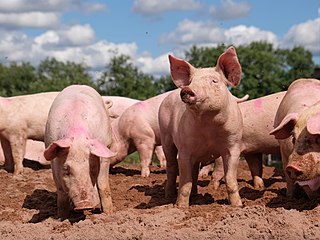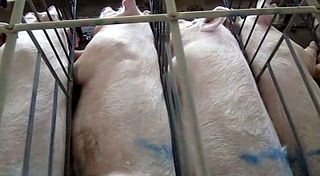
Intensive pig farming, also known as pig factory farming, is the primary method of pig production, in which grower pigs are housed indoors in group-housing or straw-lined sheds, whilst pregnant sows are housed in gestation crates or pens and give birth in farrowing crates.

Tyson Foods, Inc. is an American multinational corporation based in Springdale, Arkansas that operates in the food industry. The company is the world's second-largest processor and marketer of chicken, beef, and pork after JBS S.A. It annually exports the largest percentage of beef out of the United States. Together with its subsidiaries, it operates major food brands, including Jimmy Dean, Hillshire Farm, Ball Park, Wright Brand, Aidells, and State Fair. Tyson Foods ranked No. 79 in the 2020 Fortune 500 list of the largest United States corporations by total revenue.

The meat-packing industry handles the slaughtering, processing, packaging, and distribution of meat from animals such as cattle, pigs, sheep and other livestock. Poultry is generally not included. This greater part of the entire meat industry is primarily focused on producing meat for human consumption, but it also yields a variety of by-products including hides, dried blood, protein meals such as meat & bone meal, and, through the process of rendering, fats.

The pig, often called swine, hog, or domesticpig when distinguishing from other members of the genus Sus, is an omnivorous, domesticated, even-toed, hoofed mammal. It is variously considered a subspecies of Sus scrofa or a distinct species. The pig's head-plus-body length ranges from 0.9 to 1.8 m, and adult pigs typically weigh between 50 and 350 kg, with well-fed individuals even exceeding this range. The size and weight of hogs largely depends on their breed. Compared to other artiodactyls, a pig's head is relatively long and pointed. Most even-toed ungulates are herbivorous, but pigs are omnivores, like their wild relative. Pigs grunt and make snorting sounds.

JBS USA Holdings, Inc. is a meat processing company and a wholly owned subsidiary of the Brazilian multinational JBS S.A. The subsidiary was created when JBS entered the U.S. market in 2007 with its purchase of Swift & Company.
Seaboard Corporation is a diverse multinational agribusiness and transportation conglomerate with integrated operations in several industries. In the United States, the company mainly engages in pork production and processing and ocean transportation. Internationally, Seaboard is primarily engaged in commodity merchandising, grain processing, sugar production and electrical power generation. The parent company, Seaboard Corporation is based in the Kansas City suburb of Merriam, Kansas. Its subsidiaries include Seaboard Foods, Seaboard Marine, Seaboard Overseas & Trading Group (SOTG), Tabacal Agroindustria, Transcontinental Capital Corporation, Ltd. (TCCB), and Mount Dora Farms. It has 50% non-controlling interest in Butterball, LLC. Its principal operating divisions are pork, commodity trading and milling, marine, sugar, and power. More than 50% of the corporation is owned by members of its founding family, the Breskys.

Ribs of pork, beef, lamb, and venison are a cut of meat. The term ribs usually refers to the less meaty part of the chops, often cooked as a slab. Ribs of bison, goat, ostrich, crocodile, alligator, llama, alpaca, beefalo, African buffalo, water buffalo, kangaroo, deer, and other animals are also consumed in various parts of the world.

ContiGroup Companies, Inc (CGC) was founded by Simon Fribourg in Arlon, Belgium, in 1813 as a grain-trading firm. Formerly known as Continental Grain, ContiGroup has expanded into a multinational corporation with offices and facilities in 10 countries while employing more than 13,500 people worldwide. Today, CGC is one of the largest privately held corporations in the United States.

Farmland Industries was the largest agricultural cooperative in North America when it eventually sold all of its assets in 2002–04. During its 74-year history, Farmland served its farmer membership as a diversified, integrated organization, playing a significant role in agricultural markets both domestically and worldwide.
Smithfield Foods, Inc., is a pork producer and food-processing company based in Smithfield, Virginia. It operates as an independent subsidiary of the Chinese-owned conglomerate WH Group. Founded in 1936 as the Smithfield Packing Company by Joseph W. Luter and his son, the company is the largest pig and pork producer in the world. In addition to owning over 500 farms in the US, Smithfield contracts with another 2,000 independent farms around the country to raise Smithfield's pigs. Outside the US, the company has facilities in Mexico, Poland, Romania, Germany, Slovakia and the United Kingdom. Globally the company employed 50,200 in 2016 and reported an annual revenue of $14 billion. Its 973,000-square-foot meat-processing plant in Tar Heel, North Carolina, was said in 2000 to be the world's largest, slaughtering 32,000 pigs a day.

A gestation crate, also known as a sow stall, is a metal enclosure in which a farmed sow used for breeding may be kept during pregnancy. A standard crate measures 6.6 ft x 2.0 ft.

Intensive animal farming, industrial livestock production, and macro-farms, also known as factory farming, is a type of intensive agriculture, specifically an approach to animal husbandry designed to maximize production while minimizing costs. To achieve this, agribusinesses keep livestock such as cattle, poultry, and fish at high stocking densities, at large scale, and using modern machinery, biotechnology, and global trade. The main products of this industry are meat, milk and eggs for human consumption. There are issues regarding whether intensive animal farming is sustainable in the social long-run given its costs in resources. Analysts also raise issues about its ethics.

Pig farming or pork farming or hog farming is the raising and breeding of domestic pigs as livestock, and is a branch of animal husbandry. Pigs are farmed principally for food and skins.

WH Group, formerly known as Shuanghui Group, is a publicly traded Chinese multinational meat and food processing company headquartered in Hong Kong. Sometimes also known as Shineway Group in English-speaking countries, the company's businesses include hog raising, consumer meat products, flavoring products, and logistics. It is the largest meat producer in China.

The environmental impact of pig farming is mainly driven by the spread of feces and waste to surrounding neighborhoods, polluting air and water with toxic waste particles. Waste from pig farms can carry pathogens, bacteria, and heavy metals that can be toxic when ingested. Pig waste also contributes to groundwater pollution in the forms of groundwater seepage and waste spray into neighboring areas with sprinklers. The contents in the spray and waste drift have been shown to cause mucosal irritation, respiratory ailment, increased stress, decreased quality of life, and higher blood pressure. This form of waste disposal is an attempt for factory farms to be cost efficient. The environmental degradation resulting from pig farming presents an environmental injustice problem, since the communities do not receive any benefit from the operations, and instead, suffer negative externalities, such as pollution and health problems. The United States Agriculture and Consumer Health Department has stated that the "main direct environmental impact of pig production is related to the manure produced.
Smithfield Foods has been sued multiple times related to the disposal of hog waste using anaerobic lagoons. State governments have responded to the suits against Smithfield and similar litigation by strengthening ”Right-to-Farm” laws.

The meat industry has been severely affected by the COVID-19 pandemic in the United States. Outbreaks of the virus have taken place in factories operated by the meat packing industry and the poultry processing industry. These outbreaks affected dozens of plants, leading to closures of some factories and disruption of others, and posed a significant threat to the meat supply in the United States. By April 27, 2020, there were at least 115 facilities with cases across 23 states, and at least 4,913 workers diagnosed positive with COVID-19, or approximately 3 percent of the workforce, with 20 deaths reported.
Iowa Select Farms is a pork production operation, the largest in Iowa, and the fourth largest in the United States.
Muyuan Foodstuff is a Chinese food company specializing in pork production. As of 2019, Muyuan slaughters approximately five million pigs per year. They operate the world's largest pig farm.
Wens Foodstuff Group is a Chinese food company specializing in pork production.













